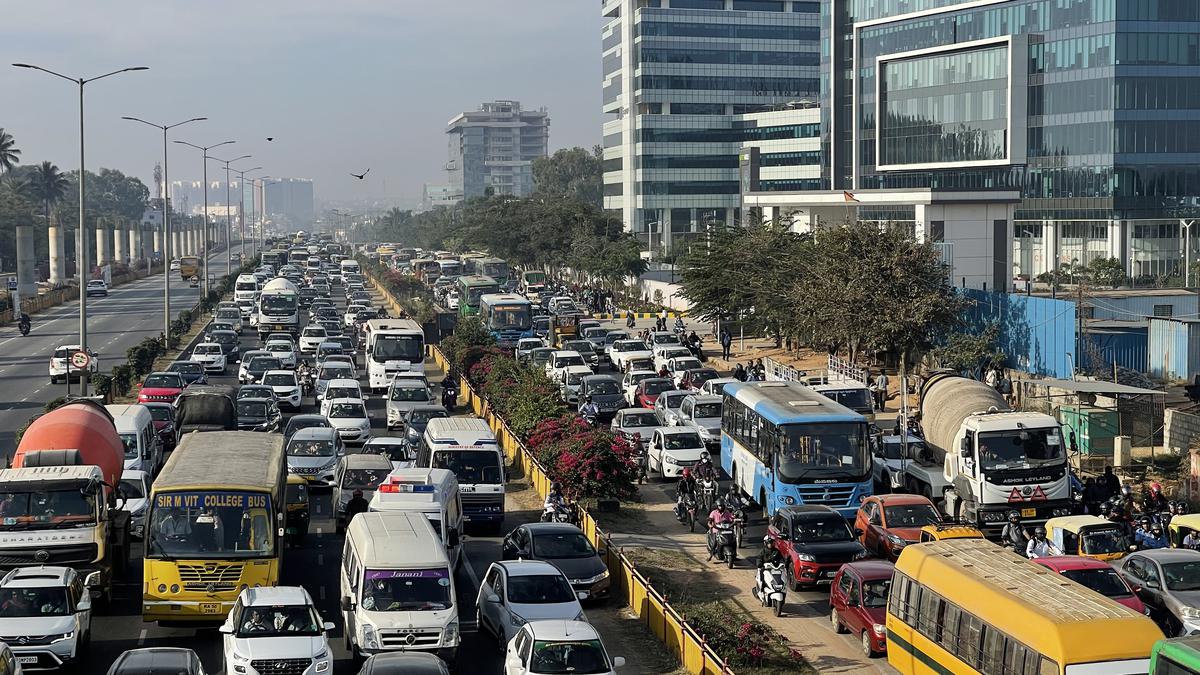
Bengaluru’s traffic takes a deafening turn for the worst Premium
The Hindu
The amended Motor Vehicles Act unequivocally mandates that loud, shrill, musical horns are illegal. But repeated, continuous, unnecessary honking goes absolutely unchecked in road stretches across the city.
Driven by ceaseless, rampaging road traffic growth, vehicular noise pollution has hit pandemic proportions in Bengaluru. Yet, despite proven, serious health hazards, the City’s traffic, transport, and pollution control agencies are in no mood to kickstart an urgent, coordinated effort to pin down the honkers. Their collective inaction is deeply affecting thousands of schools, hospitals, and old age homes.
Here are some alarming statistics: During the 31 days of July, night time noise levels skyrocketed by a whopping 106% at RVCE Mysore Road Silence Zone, one of the city’s 10 Continuous Noise Monitoring Stations set up by the Karnataka State Pollution Control Board (KSPCB). The night time (10 p.m. to 6 a.m.) noise limit is 40 dB(A)Leq, the weighted average of sound decibel levels on scale ‘A,’ relatable to human hearing. The RVCE station read 82 dB(A)Leq.
In the BTM Layout residential area, the night time noise recorded was 55.1% above the limit. At the Indira Gandhi Institute of Child Health, attached to NIMHANS, a silence zone, the noise exceeded by a substantial 48.3%. Only in the industrial areas of Peenya and Whitefield were the levels within the limits (Day time: 75 dB(A)Leq and Night time: 70 dB(A)Leq).
Stringent, clear, and calculated, the laws are firmly in place. The amended Motor Vehicles Act unequivocally mandates that loud, shrill, musical horns are illegal. But repeated, continuous, unnecessary honking goes absolutely unchecked in road stretches across the city. Even residential areas during night time are not spared. If these do not warrant action, what does?
Clueless about what noise pollution can do to people’s health, motorists blatantly violate ‘Silent Zone’ regulations. Every study on the topic has clearly established the ill effects: Stress, high blood pressure, panic attacks, temporary or permanent hearing issues, early onset of age-related hearing, vertigo, sleep disturbance, road rage, reduced productivity, depression, irritability, poor scholastic performance among children.
In Regional Transport Offices (RTOs) across the city, vehicles lined up for registration renewals are rarely checked for noise pollution. Spearheading a campaign to arrest the spiraling problem through multi-stakeholder participation, Rajkumar Dugar from Citizens for Citizens (C4C) notes that RTOs will penalise for paint issues but not noise pollution.
Most vehicles that come for renewal, he points out, are not compliant with the rules after a few years, because people would have changed a horn, or added a new one. Clear orders from the Karnataka State Pollution Control Board (KSPCB) on this issue are rarely followed.











